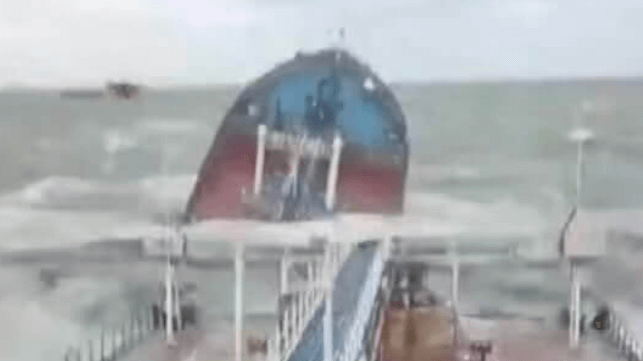Captain of Lost Volgoneft Tanker Had Expired License Russia Says in Court

Russia’s state environmental organization, Rosprirodnadzor, alleged in court this week that the operator of the two tankers that were lost in December 2024 had multiple violations. The latest accusations of expired licenses came as the environmental watchdog is seeking further compensation and actions from the tanker operator to address the environmental impact of the dual casualties.
The river sea tanker Volgoneft 212 sank in a wintertime storm in December 2024, transporting 4,300 tonnes of oil. A second tanker of the same operator, Volgoneft 239, ran aground around the same time in the area near the Kerch Strait. Together, the two vessels were carrying approximately 9,200 metric tons of heavy fuel oil. The authorities estimate that half of the fuel was released in the two incidents, and days later, a third Volgoneft tanker, 109, also reported a leak while it was in port.
As part of the suit, the Russian authorities told the court that the captain of Volgoneft 239 was operating the vessel with an expired license. It said the unnamed master’s license was expired for “several days” prior to the vessel getting underway and encountering a winter storm in the Kerch Strait region. Some media reports had previously claimed the helmsman aboard the tanker was operating the ship alone, something that has been repeatedly denied.
Russian authorities further said that the operator of the tankers, Volgoneft, was not certified to operate the vessels in open waters during the winter months, according to a report in the Moscow Times. The company blames heavy winter weather in the region for both of the casualties.
The reports highlight that the vessels are based on a 1950s Soviet-era design. They were primarily built for river and calm water transport. The vessels are each approximately 133 meters (435 feet) long and 4,000 to 5,000 dwt. Reports said they were originally designed for seas less than seven feet, but reports contend the 239 was encountering 25-foot waves in December 2024 when it was lost.
Rosprirodnadzor is suing the tanker operator, saying it is its responsibility to pay for the cleanup and salvage of the tankers. The bow section of 239 remains submerged, which led to a dispute over its conditions. The court reports said the bow section continues to leak oil, and the next efforts at recovery and sealing the leaks are not scheduled till October.
The agency, however, quickly issued a denial saying that no current leaks were detected. It said, however, it remains the responsibility of the operator and acknowledged the potential environmental dangers from further leaks. Volgoneft has been suing to prevent the Russian authorities in Crimea from taking over the salvage efforts as the tanker operator contends that it would lead to inflated costs. Russian authorities wanted the remaining fuel pumped from the bow section of the vessel.
They told the court that the Anapa region has spent more than 211 million rubles (approximately $2.7 million) on cleanup efforts. It said that nearly 200,000 metric tons of contaminated sand have been removed and over 310 miles of coastline have been cleaned. The city has sued the operator separately for its costs.
Ukraine has also said it would seek to prosecute for the damages it received from the drifting oil.
The Russian authorities in February 2025 launched an inspection program for all the Soviet-era river-sea tankers. The reports said there were over 500 tankers built in the 1960s and 1970s that they would be inspecting, and none could return to service before they had been inspected.
